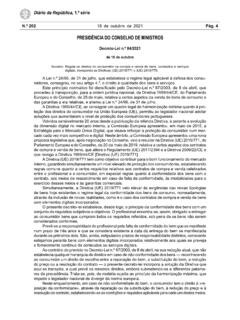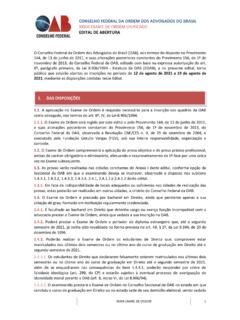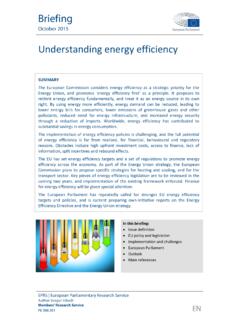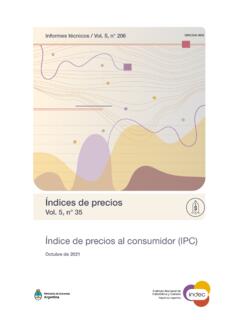Transcription of Journal of Philosophy, Inc.
1 Journal of Philosophy, AbsurdAuthor(s): Thomas NagelReviewed work(s):Source: The Journal of Philosophy, Vol. 68, No. 20, Sixty-Eighth Annual Meeting of theAmerican Philosophical Association Eastern Division (Oct. 21, 1971), pp. 716-727 Published by: Journal of Philosophy, URL: .Accessed: 19/08/2012 01:08 Your use of the JSTOR archive indicates your acceptance of the Terms & Conditions of Use, available at ..JSTOR is a not-for-profit service that helps scholars, researchers, and students discover, use, and build upon a wide range ofcontent in a trusted digital archive. We use information technology and tools to increase productivity and facilitate new formsof scholarship.
2 For more information about JSTOR, please contact . Journal of Philosophy, Inc. is collaborating with JSTOR to digitize, preserve and extend access to The Journalof 7i6 THE Journal OF PHILOSOPHY The former stands as valid only if we can find criteria for assigning a different logical form to 'allegedly' than to 'compulsively'. In this case, the criteria exist: 'compulsively' is a predicate, 'allegedly' a sentence adverb. But in countless other cases, counterexamples are not so easily dismissed. Such an example, bearing on the inference in question, is Otto closed the door partway Therefore Otto closed the door It seems clear to me that better data are needed before progress can be made in this area; we need much more refined linguistic classifications of adverbial constructions than are presently avail- able, if our evidence concerning validity is to be good enough to per- mit a richer logical theory.
3 In the meantime, Montague's account stands: there is no reason to think a more refined theory, if it can be produced, should not be obtainable within the framework he has given us. RICHMOND H. THOMASON Yale University THE ABSURD * M OST people feel on occasion that life is absurd, and some feel it vividly and continually. Yet the reasons usually offered in defense of this conviction are patently in- adequate: they could not really explain why life is absurd. Why then do they provide a natural expression for the sense that it is? I Consider some examples. It is often remarked that nothing we do now will matter in a million years.
4 But if that is true, then by the same token, nothing that will be the case in a million years matters now. In particular, it does not matter now that in a million years nothing we do now will matter. Moreover, even if what we did now were going to matter in a million years, how could that keep our present concerns from being absurd? If their mattering now is not enough to accomplish that, how would it help if they mattered a million years from now? Whether what we do now will matter in a million years could make the crucial difference only if its mattering in a million years depended on its mattering, period. But then to deny that whatever * To be presented in an APA symposium on The Meaning of Life, December 29, 1971.
5 Co-symposiasts will be Rogers Albritton and William Richardson; neither of their papers are available at this time. THE ABSURD 7I7 happens now will matter in a million years is to beg the question against its mattering, period; for in that sense one cannot know that it will not matter in a million years whether (for example) someone now is happy or miserable, without knowing that it does not matter, period. What we say to convey the absurdity of our lives often has to do with space or time: we are tiny specks in the infinite vastness of the universe; our lives are mere instants even on a geological time scale, let alone a cosmic one; we will all be dead any minute.
6 But of course none of these evident facts can be what makes life absurd, if it is absurd. For suppose we lived forever; would not a life that is absurd if it lasts seventy years be infinitely absurd if it lasted through eternity? And if our lives are absurd given our present size, why would they be any less absurd if we filled the universe (either because we were larger or because the universe was smaller)? Reflection on our minuteness and brevity appears to be intimately connected with the sense that life is meaningless; but it is not clear what the connection is. Another inadequate argument is that because we are going to die, all chains of justification must leave off in mid-air: one studies and works to earn money to pay for clothing, housing, entertain- ment, food, to sustain oneself from year to year, perhaps to support a family and pursue a career-but to what final end?
7 All of it is an elaborate journey leading nowhere. (One will also have some effect on other people's lives, but that simply reproduces the problem, for they will die too.) There are several replies to this argument. First, life does not consist of a sequence of activities each of which has as its purpose some later member of the sequence. Chains of justification come repeatedly to an end within life, and whether the process as a whole can be justified has no bearing on the finality of these end-points. No further justification is needed to make it reasonable to take aspirin for a headache, attend an exhibit of the work of a painter one admires, or stop a child from putting his hand on a hot stove.
8 No larger context or further purpose is needed to prevent these acts from being pointless. Even if someone wished to supply a further justification for pursuing all the things in life that are commonly regarded as self- justifying, that justification would have to end somewhere too. If nothing can justify unless it is justified in terms of something outside itself, which is also justified, then an infinite regress results, and no chain of justification can be complete. Moreover, if a finite chain of reasons cannot justify anything, what could be accomplished by 7I8 THE Journal OF PHILOSOPHY an infinite chain, each link of which must be justified by something outside itself?
9 Since justifications must come to an end somewhere, nothing is gained by denying that they end where they appear to, within life- or by trying to subsume the multiple, often trivial ordinary justifi- cations of action under a single, controlling life scheme. We can be satisfied more easily than that. In fact, through its misrepresen- tation of the process of justification, the argument makes a vacuous demand. It insists that the reasons available within life are incom- plete, but suggests thereby that all reasons that come to an end are incomplete. Tlis makes it impossible to supply any reasons at all. The standard arguments for absurdity appear therefore to fail as arguments.
10 Yet I believe they attempt to express something that is difficult to state, but fundamentally correct. II In ordinary life a situation is absurd when it includes a conspicuous discrepancy between pretension or aspiration and reality: someone gives a complicated speech in support of a motion that has already been passed; a notorious criminal is made president of a major philanthropic foundation; you declare your love over the telephone to a recorded announcement; as you are being knighted, your pants fall down. When a person finds himself in an absurd situation, he will usually attempt to change it, by modifying his aspirations, or by trying to bring reality into better accord with them, or by removing himself from the situation entirely.







